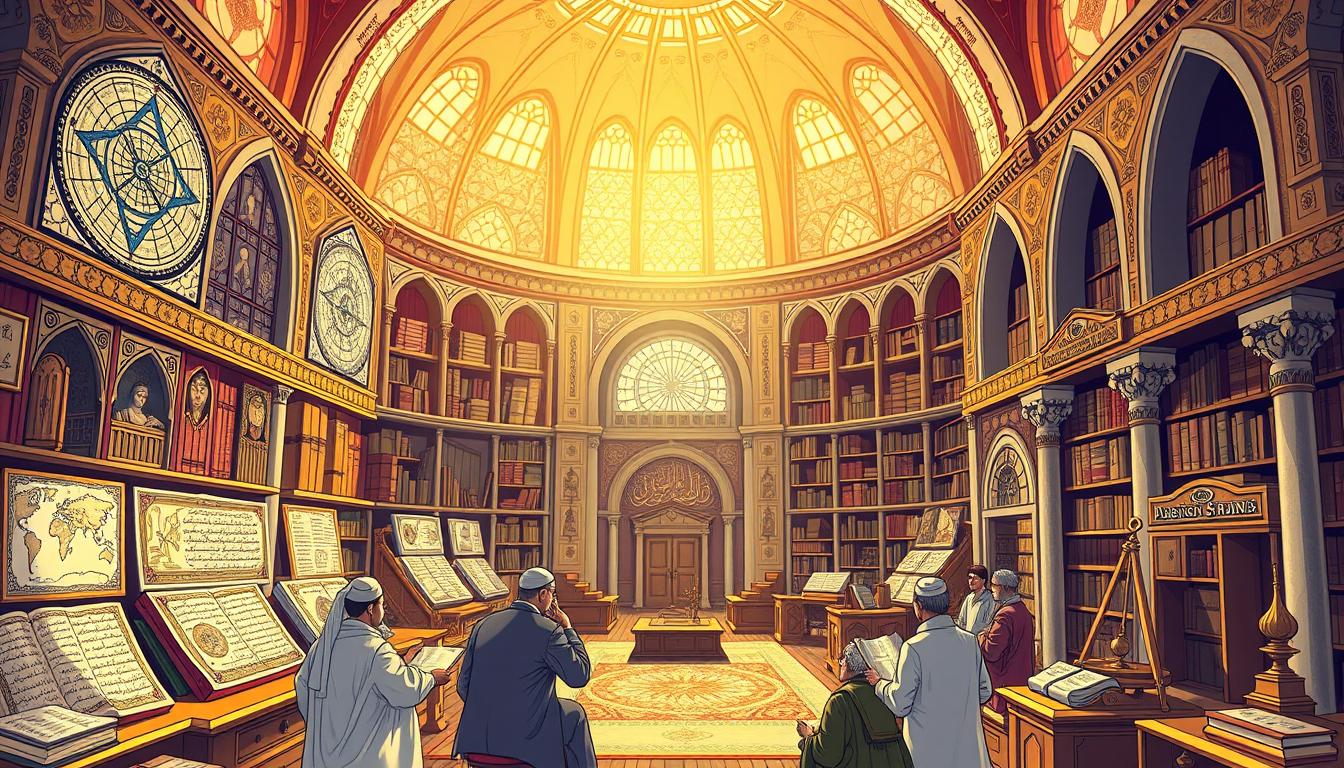Islam and Science: What’s the Connection?
Can a 1400-year-old faith inspire modern scientific breakthroughs? The link between Islam and science is more profound than you might imagine. This bond has greatly influenced our view of the world, from ancient times to today.
Muslim scholars have always seen science as a way to understand God’s creation. The Quran urges us to observe and think about the world around us. This mix of faith and reason led to big scientific achievements during the Islamic Golden Age. It impacted areas like medicine and astronomy.
Now, with challenges like climate change and losing biodiversity, Islamic views on science offer important insights. The idea that humans must care for the planet, based on Islamic teachings, guides us ethically. This blend of faith and science keeps sparking new ideas and discussions in the Muslim world and elsewhere.
Key Takeaways
- Islamic civilization made major contributions to various scientific fields
- The Quran encourages observation and reflection on the natural world
- Muslim scholars introduced empirical and experimental approaches to science
- Islamic ethics provide a framework for addressing modern scientific challenges
- The relationship between Islam and science continues to evolve in the contemporary world
The Islamic Worldview and Scientific Inquiry
The Islamic worldview puts humans at the heart of creation. This view combines faith and reason in a unique way. It sees knowledge as a spiritual journey, urging believers to explore the world.
The Concept of Tawhid and Its Influence on Scientific Thought
Tawhid is the core of Islamic belief, saying God is one. This idea deeply affects Islamic science. It makes Muslims see the universe as a single, orderly system showing God’s wisdom.
This view has driven many Muslim scholars to seek scientific knowledge. They aim to understand God’s creation through science.
The Qur’an’s Encouragement of Reflection and Observation
The Qur’an is key in encouraging science. It has over 800 verses that ask readers to think and study the world. This divine push has fueled Islamic science’s growth.
Scientists see their work as a form of worship. They seek to discover the wonders of creation.
Islamic Philosophy and the Pursuit of Knowledge
Islamic philosophy sees knowledge as a whole. It blends faith and reason, valuing both revelation and observation. This mix has led to big advances in science, from optics to math.
“The ink of the scholar is more holy than the blood of the martyr.” – Prophet Muhammad
Islamic history is full of great scientists like Alhazen and Abdus Salam. Alhazen wrote over 200 books, and Abdus Salam won a Nobel Prize in Physics. Their work shows Islamic philosophy’s lasting impact on science.
The Golden Age of Islamic Science
The Golden Age of Islam lasted from the 8th to the 13th century. It was a time of great scientific progress. Muslim scholars made huge contributions in many fields, leading to new technologies that changed the world.
Contributions to Scientific Fields
Islamic scientists were experts in many areas. They improved astronomy, creating better models of the universe. In math, Al-Khwarizmi started algebra and introduced Arabic numbers.
They also made big strides in medicine. They described diseases like smallpox and measles in detail.
The Translation Movement
The Translation Movement was a big reason for the scientific growth. Muslim leaders spent a lot on translating ancient texts from Greek, Syriac, and Sanskrit into Arabic. The House of Wisdom in Baghdad was a key place for this work, costing a lot.
Notable Muslim Scientists
Many talented scientists lived during this time. Al-Biruni made important astronomical discoveries. Ibn Bassāl and Ibn al-‘Awwam helped with agriculture through their plant studies.
Al-Battani and al-Zarqali also made big improvements in astronomy. Their work helped with navigation and keeping time.
- Al-Kindi translated works from various cultures
- Avicenna made advancements in medicine and philosophy
- Al-Dinawari described thousands of plants, boosting pharmacology
The Golden Age of Islam showed how important sharing knowledge and scientific research are. It had a big impact on science worldwide.
Islamic Concepts of Knowledge and Nature
Islamic science comes from a special view of knowledge and nature. The Quran and science blend in Islamic thought. This blend sees nature as made by God, encouraging Muslims to learn and understand the world.
In Islam, knowledge is a gift from Allah. The Quran tells believers to watch and think about nature. This led to a time of great scientific discovery from the 8th to 12th centuries. During this era, Muslims set up research centers and led in scientific ideas.
Islamic philosophy sees nature in different levels of reality. These levels are the material, psychic, and spiritual. This view helps scientists look at the world in a complete way, including both physical and spiritual sides.
“Seek knowledge from the cradle to the grave.” – Prophet Muhammad
The Quran’s focus on knowledge goes beyond what we can see. It invites us to explore the unseen world known only to Allah. This wide range of study has led to many Islamic scientific achievements in various areas.
Today, Islamic education still mixes faith and scientific study. In Indonesia, for example, the school curriculum includes both religious teachings and science. This goal is to raise individuals who can grow science while keeping their faith strong.
The Integration of Faith and Reason in Islamic Thought
Islamic philosophy combines faith and reason in a special way. This mix is at the heart of Islamic science. It shapes how Muslims see the world and seek knowledge.
The Role of ‘Aql in Islamic Scientific Methodology
‘Aql, or intellect, is key in Islamic science. Muslims believe reason, guided by God’s word, helps us understand the world. This idea promotes critical thinking and observation in science.
Balancing Revelation and Empirical Observation
Islamic thought aims for balance between divine wisdom and scientific proof. Many Muslims see the Quran as a source of scientific truths. This view encourages curiosity and discovery within religious limits.
Ethical Framework in Islamic Scientific Inquiry
Islamic ethics guide scientific research. These rules make sure science stays moral, leading to good discoveries. This ethical base helps Muslim scientists balance progress with spiritual values.
“Science without religion is lame, religion without science is blind.” – Albert Einstein
Recent studies show Muslims see science and religion as connected. A survey of 72 people from various faiths found Muslims often see the Quran as scientific. This shows the ongoing importance of blending faith and reason in Islamic science.
The Influence of Islamic Teachings on Scientific Advancements
Islamic teachings have greatly influenced science throughout history. They encouraged the pursuit of knowledge, leading to many important scientific discoveries. These discoveries were made in many different fields.
Islamic Rituals and Scientific Problem-Solving
Islamic rituals have inspired new ways of solving scientific problems. For instance, figuring out the right times and directions for prayer led to big steps in astronomy, geography, and math. This led to the creation of advanced tools like the astrolabe and quadrant, and better maps for navigation.
Impact of Islamic Ethics on Environmental Science
Islamic ethics focus on taking care of the environment. The Quran teaches about living in balance with nature. This has helped Muslim scientists work on sustainable practices and conservation.
This approach has helped in areas like agriculture, water management, and protecting wildlife.
Islamic Perspectives on Cosmology
Islamic teachings have deeply shaped our understanding of the universe. Scholars like Al-Biruni and Ibn al-Haytham made big contributions. Their work, inspired by the Quran, led to major discoveries in astronomy and physics.
These achievements show how Islamic beliefs and science go hand in hand. Islam’s focus on learning has led to great progress in science. This shows the lasting effect of Islamic teachings on science.
Challenges and Controversies in Islamic Science
The journey of Islamic scientific contributions has faced hurdles over time. The 14th to 16th centuries saw a decline in scientific progress within Muslim civilization. This shift raised questions about what’s the connection between Islam and science today.
One significant challenge is the disconnect between traditional Islamic knowledge and modern scientific advancements. For instance, some Islamic interpretations suggest there are 360 joints in the human body. Medical communities contest this, noting the actual number averages around 307 per person.
Another controversy arose from the 2005 tsunami. While geologists attribute such events to plate tectonics, some religious leaders viewed it as divine retribution. This highlights the ongoing struggle to reconcile scientific explanations with religious interpretations.
The current state of science in Muslim countries presents a stark contrast to past Islamic scientific contributions. Muslim countries have nine scientists, engineers, and technicians per thousand people, compared to the world average of forty-one. This gap underscores the need for renewed focus on scientific education and research in the Islamic world.
“Between 1980 and 2000, Korea granted 16,328 patents while nine Arab countries, including Egypt, Saudi Arabia, and the U.A.E., granted a combined total of only 370.”
Bridging this divide requires addressing complex issues like inadequate funding, brain drain, and the balance between religious teachings and scientific inquiry. The path forward lies in fostering an environment that encourages critical thinking and innovation while respecting Islamic values.
Modern Science in the Muslim World
The Muslim world is seeing a new era of scientific growth. Many countries are now teaching Western science to their young people. This change shows how science is becoming more important in Islamic societies.
The Revival of Scientific Inquiry in Islamic Countries
Islamic countries are embracing new science and technology. Over the last twenty years, scholars have explored how Islam relates to modern science. They believe that by reconnecting with Islamic science, Islamic civilization can regain its strength.
Bridging Traditional Islamic Knowledge and Contemporary Science
Islamic thought is key in combining faith and reason. Seyyid Hossein Nasr, a physics and mathematics expert from MIT, now teaches Islamic Studies at Georgetown University. He talks about how Western science affects the beliefs of young people in Islamic countries.
Islamic Institutions Promoting Scientific Research and Education
Since World War II, over sixty new universities and technical schools have opened in Arabic-speaking countries. These places produce many science and engineering graduates every year. Also, many Muslim students have studied abroad and then returned to help their countries’ science.
- Forty-one predominantly Muslim countries generate less than 5 percent of global science output
- The period 1850-1914 saw rapid diffusion of Western technologies in the Middle East
- Hundreds of thousands of Muslim students have studied science abroad since the 1950s
Despite challenges, the Muslim world is advancing in science and education. This new focus aims to tackle internal issues and make Islamic countries important in the global science scene.
Conclusion
The bond between Islam and science is deep and complex, spanning many centuries. Islamic scholars have greatly influenced our understanding of the world. Their work in algebra and optics, for example, has left a lasting impact on science.
Islam’s unique blend of faith and reason has guided its scientific approach. Scholars like Ibn Sina and Al-Razi made major contributions in medicine and philosophy. The Islamic Golden Age, from the 8th to the 16th century, was a time of great knowledge growth.
Today, the conversation between Islam and science is still ongoing. Conferences like the International Conference on Islam and Science bring scholars together. Their work, rooted in the principles of Muslim thinkers, continues to inspire new discoveries.
Source Links
- Islamic attitudes towards science
- Where science and religion meet, from an Islamic perspective — Harvard Gazette
- Islam’s Encounter with Modern Science
- What Makes Islamic Science Islamic?
- Islam and Science – The Troubled Relationship Muslim Science
- Science in the medieval Islamic world
- Islamic Golden Age
- Kazi.qxd
- The Quran and Modern Science33 min read
- On the Intersection of Science and Religion
- Religion and Science
- Faith and Reason | Internet Encyclopedia of Philosophy
- What is Islam’s view about education, science and technology? — GainPeace
- The Contribution of Muslims to the World of Science
- Science and Islam in Conflict
- Why the Arabic World Turned Away from Science
- Science, modernity, and the Muslim world: To improve scientific research in Muslim countries requires profound social and economic liberalization of their societies
- Islam and Modern Science
- Why Does the Muslim World Lag in Science?
- Islam and Science: Exploring the Relationship between Faith and Knowledge
- The Intersection of Islam and Science: A Historical Perspective







